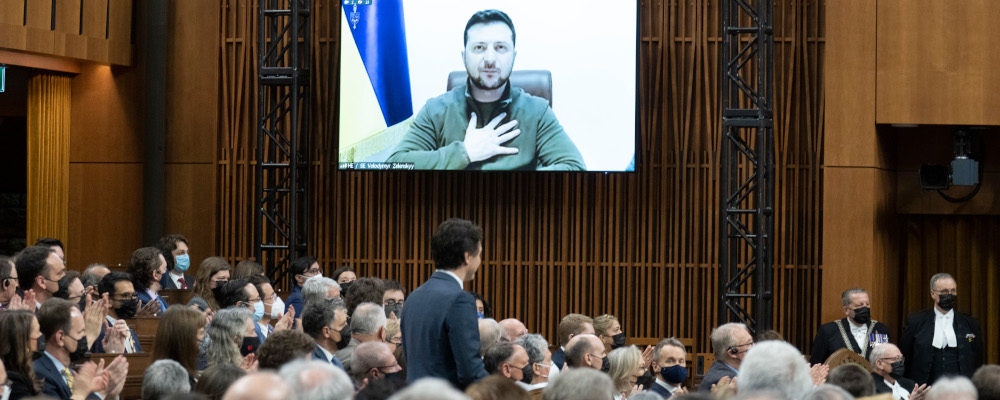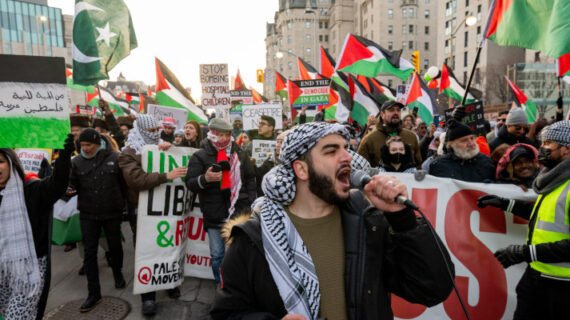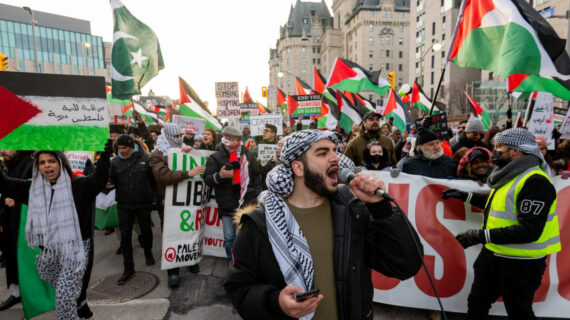An American friend emailed me recently to say that the people in his affluent suburban neighbourhood who had pro-Fauci signs on their lawns last month have replaced them with Ukrainian flags. I’ve seen something similar in my occasional forays onto Twitter, where masked emojis and the holy trinity of syringes have given way to Ukrainian flags and little blue and yellow hearts. Welcome to war in the social media age. But how different is this online boosterism from how wars have always been fought away from the battlefield? And how will it affect our governments’ strategies, especially if the war drags on for months or years?
It is easy to be cynical about the speed with which amateur epidemiologists have become amateur Sovietologists and to dismiss social media posts on Russian and Ukrainian history adorned with references to Kievan Rus’ and the Holy Alliance that resemble suspiciously the relevant Wikipedia entries. But the sudden popular fervor over a hitherto overlooked foreign country is not new. Long before TikTok and Twitter, an outraged British public responded to the German invasion of Belgium in August 1914 with a similar surge of jingoism by proxy.
Roused by reports of German brutality and Belgian defiance, the celebrities of the day took up the cause of “Plucky Belgium.” Thomas Hardy composed a “Sonnet on the Belgian Expatriation” and Edward Elgar composed “Chantons, Belges, Chantons.” Politicians, including Prime Minister H.H. Asquith and the man who would replace him, David Lloyd George, penned stirring encomia to the heroes of the Belgian resistance. Even Churchill, who privately wrote that “This is no time for charity” and thought that the Belgians, especially those of fighting age, “ought to stay there and eat up continental food and occupy German policy attention,” was publicly effusive.
As the German war machine cleared a bloody path through Belgium towards France, the British welcomed almost a quarter of a million refugees into their homes and “Remember Belgium” became a British Army recruiting slogan. In the end, the Belgian army held out for a remarkable month and a half against a German army more than ten times its size, which bought essential time for the French and the British to mobilise and hold a Western Front whose northern end ran through a muddy corner of Belgium. There is a good reason we still remember “Flanders Fields” and place names like Mons, Ypres, and Passchendaele.
The parallel to today is instructive but inexact. Unless we send hundreds of thousands of young men and women to die in Ukraine, we are unlikely to remember the name of her cities a century from now the same way we remember the Belgian front. And that is a good thing. Our leaders have wisely made it clear that, while our sympathy and support are firmly with Ukraine, this is not our war to fight. That doesn’t mean we don’t have a role to play, but it does mean that for now the popular desire to cast Putin as Hitler (as though he weren’t bad enough on his own merits) is taking a back seat to the relative sobriety of international diplomacy.
Twitter and Facebook are, unsurprisingly, cluttered with what Aris Roussinos has called “[t]ruth, partial truths and outright lies.” Russian propaganda, which has been actively trying to destabilize western politics for most of the last decade, now competes for public attention alongside Ukrainian propaganda, which alternates between dubious mythmaking (remember the “Ghost of Kyiv”?) and begging for more direct western involvement in the war. I don’t blame the Ukrainians. Every country uses propaganda in wartime—Britain and France certainly used it in both World Wars to cajole the Americans into action. When your very existence is at stake, you fight with the weapons you have, including both information and misinformation. The creativeness, to put it kindly, of some of Ukraine’s messaging doesn’t alter the worthiness of its message.
Social media also complicates matters by shining a spotlight on the parts of war we prefer not to think about. General Sherman famously said that “war is hell,” but it is a peculiar sort of hell that contains both good guys and bad guys. Sometimes (though rarely) the bad guys do good things, and sometimes (less rarely) the good guys do bad things. By cherry-picking facts and images, social media can easily cast both sides in an unflattering light, drawing a false moral equivalence. So far, our leaders have not been distracted by attempts, from both the new right and the hard left, to blur the line between aggressors and victims in Ukraine. It will be important to keep that distinction clear. The Russian invasion is the problem and, as long as the war lasts,, that clear moral certainty must trump other minor moral qualms. Objections to Ukraine’s use of neo-Nazi brigades, to Zelenskyy banning opposition parties, or to broadcasting statements of downed Russian airmen in violation of the Geneva Conventions are legitimate, but not pertinent. Make a note, and we’ll circle back with the benefit of peaceful hindsight.
There is a difference, however, between bracketing moral complications and slipping into an amoral equivalence of our own, in which Putin’s inhumanity becomes an excuse for our own. This is one way in which social media, and the cancel culture it facilitates, may make things worse. The tribalism, confirmation bias, and righteous ignorance, which are bad enough when applied to domestic politics, take on a darker aspect when applied to war. The more benign online responses have ranged from the hypocritical—international companies with long lists of Russian regime-linked clients posting “We Stand with Ukraine” on their home-pages—to the hysterical—stores removing Russian vodka (already paid for, of course) from their shelves; universities cancelling Russian literature courses; law firms refusing to represent any Russian, sanctioned or unsanctioned; and orchestras refusing to perform music by Russian composers who died decades before Putin was born.
Once again, none of this is new. Petty fanaticism and irrational bigotry are reliable side-effects of the fever of war. During the First World War, German Shepherd dogs were rebranded as Alsatians and the fearsome Teutonic dachshund was rendered safely patriotic by translation to “badger dog.” Sauerkraut became “liberty cabbage” and the British First Sea Lord, Prince Louis of Battenberg, was forced to resign and become humble Lord Mountbatten. In Canada, the city of Berlin voted narrowly (51% to 49%) to change its name and, in the subsequent referendum to choose a new one, opted to memorialize Lord Kitchener over General Brock by just 11 votes. Canada also interned more than 8,500 German speaking immigrants (most from modern Ukraine) and required tens of thousands more to register and follow official restrictions. Even the royal family felt it prudent to domesticate their dynastic name from to Saxe-Coburg-Gotha to Windsor.
As far as I am concerned, if you want to let Putin deny you the enjoyment of Russian culture, then go right ahead—it leaves more Smirnoff and Rachmaninoff for the rest of us. But as the history above shows, the silliness also has a sinister side. The backlash against Russian scholars, athletes, and artists (even those who have condemned the invasion of Ukraine), and calls to treat all Russians who don’t actively denounce Putin as enemies (even though we are not in fact at war with Russia) show the persistence of the ugly temptation to assign collective guilt. This is the mindset of Putin as his army shells civilians in the suburbs of Kyiv; we should not adopt a similar reductive prejudice in response.
So far, our political leaders have been mostly measured and serious. At home, they have spoken out against scapegoating Canadians of Russian descent. And in their military and diplomatic responses, they have resisted public calls to invite Ukraine to join NATO (which even Zelenskyy recognizes would be foolish) or to declare war on Russia by enforcing a no-fly zone that would require us to shoot down Russian planes and target anti-aircraft installations in Russia.1“Should a no-fly zone turn into a limited land war—as I have argued above is at least somewhat likely—an outmatched Russian army would have recourse to beating back NATO forces with tactical nuclear weapons. If such a war could be kept under the strategic nuclear threshold—a big if—it’s not clear that the West could prevail in Ukraine given the tactical nuke disparity. In the meantime, Ukraine would be transformed into a radioactive wasteland.” https://wisdomofcrowds.live/the-ugly-truth-about-no-fly-zones/ On the positive side, Canada has joined most Western countries in providing military and humanitarian aid to Ukraine2“There have been several rounds of announcements of support from Canada, ranging from sanctions to humanitarian support. In terms of what military lethal and non-lethal aid has been committed since Feb. 27, here’s a breakdown of what the federal government says has been sent or will soon be on its way: 4,500 M72 rocket launchers and up to 7,500 hand grenades; $1 million towards the purchase of high-resolution modern satellite imagery; 100 Carl-Gustaf M2 anti-tank weapons system launchers and 2,000 rounds of ammunition; 1,600 fragmentation vests and 400,000 individual meal packs; $25 million in helmets, body armour, gas masks, and night vision gear; and Two C-130J tactical airlift aircraft and a team of 40-50 personnel to deliver aid and support.” https://www.ctvnews.ca/politics/a-lot-more-people-are-going-to-die-canada-sending-more-lethal-weapons-to-ukraine-1.5804357 and its neighbours, and Peter MacKay has offered suggestions about how we can do even more. We have also joined, and in some cases led, sanctions against the Russian economy, and Canada’s ongoing mission in Latvia is a useful deterrent to further Russian revanchism3“An additional 460 CAF personnel, along with further CAF military assets will deploy on Operation REASSURANCE in support of North Atlantic Treaty Organization (NATO). These contributions, which fall under Operation REASSURANCE, will strengthen NATO’s deterrence and defence efforts by increasing Canada’s land, maritime, and air capabilities in Europe.” https://www.canada.ca/en/department-national-defence/services/operations/military-operations/current-operations/operation-reassurance.html.
So far, so good. But the real challenge will come if current military aid and economic sanctions don’t stop the Russian army’s advances in Ukraine, or if the invasion stalls into a bloody stalemate. Ukraine’s resistance has been inspiring, but it is still very early days in this war. Putin has already been forced to adjust his strategy, call up more reserves, redeploy armour from other occupied areas like South Ossetia, reportedly call in favours from his vassal Bashar Al-Assad, and rely more on the indifferent brutality of heavy artillery. But we shouldn’t mistake Russia’s lack of victory for defeat. Russia is not yet losing the war, it’s just not winning, or perhaps it is winning more slowly than planned. Politically Putin cannot back down, so he won’t. There are already signs he plans to “escalate to de-escalate,” but he might just as well “escalate to escalate,” a horrifying strategy we saw (and, let’s not kid ourselves, ignored) in Syria and Chechnya.
If things do get worse in Ukraine, Western leaders may find it harder to resist pressure from their people, or at least those engaged in social media sabre rattling, to go harder against Russia or even to intervene militarily. They should still resist. We managed to survive a 45 year Cold War without getting this close to a shooting war with a nuclear-armed Soviet Union more than a handful of times. We did not intervene when the Soviet tanks rolled into Budapest in 1956 or Prague in 1968 because we were rightly terrified of the consequences of nuclear war. In the thirty years since the Cold War ended, I hope we have not forgotten to be afraid. War is a bad thing, but nuclear war is the worst thing. Perhaps it is not so bad after all to have a president who was already an adult during the Cuban Missile Crisis.
Resistance to escalation may also require tuning out social media calls for ever harsher sanctions from people less interested in changing Putin’s strategy than in punishing “the enemy.” Our leaders should remember that economic pain can go too far, or at least sideways (for example, Visa’s and MasterCard’s boycott is mostly hurting Russians who have fled Putin’s regime, i.e. people we should be helping). The point of sanctions is to apply economic pressure to achieve a specific goal. If we fail to define the goal, or to tailor sanctions to that goal, or if we lose sight of the goal altogether, then sanctions can have dangerous and unpredictable consequences.
In 1919, a young John Maynard Keynes predicted that the punitive terms of the Treaty of Versailles—Clemenceau’s “Carthaginian peace”—made another war with Germany inevitable: “If we aim deliberately at the impoverishment of Central Europe, vengeance, I dare predict, will not limp.” More recently and perhaps more relevantly, the collapse of the Russian economy in the early 1990s (the fault of Gorbachev and Yeltsin, rather than the West) gave us Putin and the Second Chechen War, whose unrelenting savagery looks more and more like a dress rehearsal for the Ukraine invasion. What might another economic crisis bring?
This is not an argument against sanctions. Sanctions are an important tool and they may yet work to convince Putin to save face by suing for the sort of compromise peace that Zelenskyy has said he is open to. We need to give the sanctions time to work and, in the meantime, we should adjust them both to avoid hurting the same Russians we hope will undermine Putin and to tighten them more effectively around Putin and his enablers. But if current sanctions don’t work in the coming months, it won’t necessarily mean we should impose even more and tougher sanctions. If sanctions become driven by a desire to inflict indiscriminate pain instead of by strategic calculation, they are more likely to have unintentional and unpredictable effects.
For those burning with the spirit of vengeance on social media, the speed with which we have been able to devastate the Russian economy has been thrilling to watch—a bloodless financial version of Sherman’s March to the Sea. But if you are a neutral Russian business or an historically non-aligned country, you might reasonably react to this demonstration of the West’s ability to devastate a major economy by deciding to hedge your bets with China. That way you will have at least one superpower to turn to in a crisis. The last Cold War started when the Soviet Union sealed itself off from the West. Right now, it is the West that is sealing off Russia. We should think hard about how isolating and crippling Russia may forge new alliances and lock in a permanent global realignment.
Russia and China have a complicated history of mutual competition and mistrustful collaboration. Most people know that Richard Nixon famously “went to China,” literally and figuratively in 1972, to re-establish relations with Mao’s government, but they may not remember that the point of Nixon’s diplomatic overture was to forestall the re-establishment of Sino-Soviet relations after those two countries had fallen out in 1956 over the purity of Marxist-Leninist doctrine. The United States hoped that by recognizing Maoist China it could prevent the recrudescence of an anti-Western communist alliance stretching from the heart of Europe to the maritime border with Alaska.
The US has reported that China has agreed to supply Russia, which could include anything from rations and spare parts to small arms and ammunition. Skeptics wonder what China would gain from helping Russia, but the better question is: how does China lose from prolonging a conflict between three of the other four global power blocks? President Xi must not be able to believe his good fortune. With Iraq and Afghanistan finally over, the West is now caught up in another essentially peripheral conflict that deflects our attention from his own military build-up and his hardening of regional power and global influence. If he can exploit Russia’s current weakness to fold her and her dependents more closely into the Chinese sphere of influence, he could achieve what Nixon tried so hard to prevent.
This matters because Russian aggression, though undeniably serious, is still of secondary importance compared to the immediate and long-term threat of PRC power. The PRC did to Tibet decades ago what Putin is doing to Ukraine, and they are still engaged in the ethnic and cultural erasure of the Uyghurs and the active repression of Muslims, Christians, and Falun Gong. This is one reason why Russia and China cooperate in international forums to oppose the idea of human rights and the use of sanctions as a diplomatic tool. And it is a good reason why, although their relative economic and military strength has flipped since 1972, we should still try to avoid closer Sino-Russian cooperation. Nor should we forget that Xi covets Taiwan every bit as much as Putin covets Ukraine. If we weren’t already coordinating with the United States and Europe to plan for that possibility, we have no excuse for waiting now.
If we have learned one lesson from our unpreparedness for Putin’s invasion of Ukraine, it is that the middle of a crisis is a poor time to start thinking up a response. Even after Putin’s 2014 invasion of Crimea and months of build-up on the Ukraine border, Western countries were caught flat-footed by the latest invasion. European and North American governments should have agreed to an escalating scale of sanctions long before they were needed. We had eight years to decide which Putin allies we would target and to prepare lists of their properties and assets in our own countries. We had eight years to decide whether we would deny Russian banks access to the SWIFT system or target the Russian central bank. Eight years to prepare for higher fuel prices and wheat shortages. Eight years to bring India more onside.
Instead, we were left scrambling, improvising our way to the current set of sanctions while countries fought for carve outs for their pet industries (Italy wanted an exemption for luxury goods; for Belgium it was diamonds). Our domestic economies are already feeling the effects of banning Russian oil and gas because we did not bother to develop alternative sources from our own abundant resources. Are we prepared for the much more painful effects that would attend even mild sanctions against China? Are we taking steps to secure or develop alternative sources of commodities that give China leverage over us? If not—and Xi is counting on the fact that we aren’t—I expect you’d see the current Western unity quickly fracture and our collective resolve fizzle in the face of any attempt to sanction China.
American strategist Elbridge Colby recently described Asia as “the world’s ‘decisive theater.’” That is right.4Colby expanded on his views in a recent conversation with The Hub’s editor-at-large Sean Speer. https://thehub.ca/2022-03-01/elbridge-colby-dissects-the-geopolitical-implications-of-russias-invasion-of-ukraine/ Europe may be more familiar to social media commentators determined to force every conflict into the mold of the Second World War (mirroring Putin’s attempt to do the same from the other side of the moral looking glass), but Asia remains more important for our future. In the same article, Colby warned that the West is not equipped to fight two wars at once, which means that blundering into war with a nuclear-armed Russia would not only be monumentally stupid on its own terms, it would also give a green light to Xi to move on Taiwan and consolidate China’s dominance over half Asia and almost half of the world’s economy.
There is a danger that in focusing all our attention on Ukraine we will ignore or, worse, accelerate a tectonic geopolitical shifts that will consume us for generations. Social media, which only has time for one trending obsession at a time, encourages this strategic myopia. This does not mean we should abandon Ukraine or go easy on Putin. Not at all. But it means when we think of Ukraine we must also think beyond Ukraine. And that will require making the tough decisions about military assistance, sanctions, and the best resolution of the conflict with an eye to the consequences not just for Ukraine, but for Russia, China, and the world we will have to live in for the next century.




